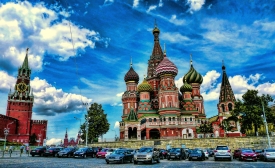russia
The Belarusian-Russian twin-town relations create a unique environment for productive trade and economic cooperation and the development of public diplomacy as well as make up a spiritual component part of the brotherhood of the two nations, [...] public organization Twinned Towns Boris Batura said at the 8th meeting of Belarusian and Russian twin towns in Podolsk on 27 November, BelTA informs.
The Russian police force has offered to send France a puppy to replace the dog killed during an anti-terrorist operation in Paris. It's a symbolic gesture perhaps indicating a shift in how Russia wants to interact with Europe.

Olga Kamenchuk discussed Russian Public Diplomacy post-Cold War.
The Carmel Institute of Russian Culture and History, American University, hosted Russian jazz legend Igor Butman at the Embassy of the Russian Federation in Washington DC. The event, meant to represent the unifying qualities of cultural cooperation[.]
“Free To Rock,” screening in Gaston Hall this Tuesday at 7:30, reveals the subculture that took a stand against communism and its denial of freedom, a chance for those unfamiliar with Soviet cultural and political history to see behind the Iron Curtain and understand the power of rock ’n’ roll.
The much-maligned U.S. State Department under Secretary John Kerry and his highly media-literate deputy, Richard Stengel (a former editor of Time magazine), is re-embracing public diplomacy as a major weapon in the West’s arsenal by dramatizing such issues, as in the Cold War. Europe would do well to follow suit. For in the long run, ideas must do much of the work.
Last week Moscow hosted the Fourth World Congress of Compatriots that brought together Russian-speaking public leaders from 97 countries. Russian President Vladimir Putin and the head of the Russian Orthodox Church, Patriarch Kirill, took part in the event and emphasized the significance of the Russian Diaspora for government leaders.







